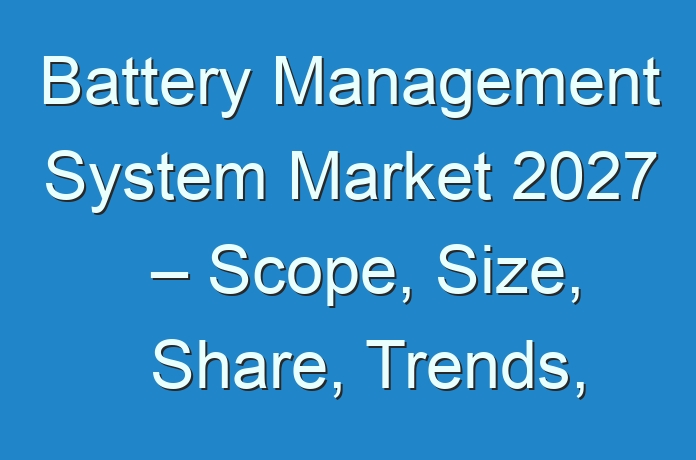
Intelligence of Battery Management Systems Amplified with Cloud-based Software and Services
Battery-operated applications and cloud-based software and services are among the top buzzwords in the vast industrial landscape that is undergoing the Fourth Industrial Revolution – Industry 4.0. With the increasing convergence of industrial operations and technology, the cloud-connected battery management system is emerging as one of the most popular trends across various industries, including automotive, telecommunications, and consumer electronics.
Cloud-based monitoring and analysis framework for battery management systems enables end users to monitor and analyze the battery data as well as algorithms that offer information related to stateofcharge (SOC) and stateofhealth (SOH) estimates. Cloud-based battery management systems also allow the online identification of potential critical battery failures at various stages of its operation, and the long-term tracking of cell aging. The growing popularity of such high-tech features is incurring transformational changes in the business strategies for stakeholders in the battery management system landscape.
Looking for exclusive market insights from business experts? Request a Custom Report
For instance, in July 2019, Bosch announced the development of cloud-based swarm intelligence services to extend the service life of electric vehicle batteries by supplementing individual vehicles’ battery management systems. This feature enables smart software functions in the cloud service that continually analyze the battery status and take appropriate actions to prevent or slow down cell aging.
The battery management system market was valued at ~US$ 3.5 billion in 2018, and is anticipated to grow aggressively up to ~US$ 16.6 billion by 2027. Technological advancements in battery management systems will continue to bolster developments in this landscape in the coming years.
Lithium-ion Batteries to Engulf Battery Management System Market in the Future
With the onset of electric-powered drivetrains designed to shift vehicle design away from conventional fuels and carbon gas emissions, the future of e-mobility is inclining towards the substantial demand for lithium-ion batteries. Battery management systems have become an integral part of lithium-ion batteries, which account for ~40% revenue share of the battery management system market. Thereby, in the coming future, the sales potential of lithium ion battery management systems will remain one of the key factors instrumental in shaping the energy storage revolution for the automotive industry.
Among the various other types of batteries that include battery management systems, lithium-ion batteries hold an important stake in the market, and their sales are estimated to grow rapidly as compared to its contemporaries such as lead-acid and nickel-based batteries. Lithium-ion batteries have proven to be the battery of interest for electric vehicle manufacturers, attributing to their high charge density and low weight, and this will continue to attract battery management system manufacturers’ attention on the lithium-ion battery landscape.
Thus, by striking the right balance in electric automotive technology, Renesas Electronics, a premier supplier of advanced semiconductor solutions, announced its fourth-generation lithium-ion (Li-ion) battery management integrated circuit, which offers maximized battery cell life and driving range for hybrid and electric vehicles. This has made Renesas Electronics set an unmatched benchmark for accurate data acquisition, temperature control, and safety performance requirements through its latest battery management system.
Renewable Energy Technology and Public Transport – Future Investments for Stakeholders
With the advent of the increased use of lithium-ion batteries in many industries, the renewable energy sector is undergoing serious research and development (R&D) to overcome technological pitfalls. Now that battery packs are available in the market in abundant types and at very competitive prices, one of the key restraints that renewable energy technology faces is battery storage to manage the variations caused by fluctuations in solar radiation or wind. Thus, stakeholders can increase R&D capacities to diversify their offerings in renewable energy solutions.
Want to know the obstructions to your company’s growth in future? Request a brochure @ https://www.transparencymarketresearch.com/sample/sample.php?flag=S&rep_id=12116
For instance, in June 2019, Hella, a German automotive parts supplier, announced the launch of Dual Voltage Battery Management System and PowerPack 48 Volt mild hybrid vehicles. These new solutions by Hella enable savings of 5 to 6 grams of CO2 per kilometer, thus helping companies and governments across countries to meet their short-term goals of reduced carbon emissions, proving automotive battery management systems as environmental-friendly patrons.
Also, the public transportation sector is undergoing technological transformations. Rising air pollution caused due to internal combustion engine cars and the non-renewable nature of oil-based fuels has incited public bodies to encourage the use of hybrid and electric vehicles. In a 200 million euro deal, two innovative electro-mobility companies and Europe’s leading manufacturer of battery systems BMZ Germany, announced an agreement delivery of over 1,000 lithium-ion battery systems to Berlin-based bus maker Eurabus GmbH.
Thus, innovations in the automotive industry and strategic partnerships for battery-driven public transportation are becoming the key strategies of manufacturers, especially in North America, Europe, and Asia Pacific.
Read Our Trending Press Release Below: http://www.prnewswire.com/news-releases/measures-to-curb-environmental-impact-of-fossil-fuel-driven-vehicles-paves-way-for-growth-of-solar-powered-cars-market-valuation-to-rise-to-us3-5-bn-by-2027–tmr-301025381.html





